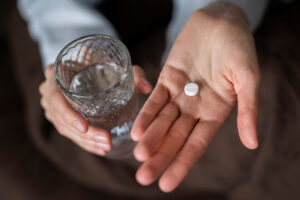Can kidney stones cause erectile dysfunction?
This question is important because urinary tract health and sexual function are more closely connected than many men realize.
Kidney stones are hard deposits that form in the kidneys when minerals and salts crystallize.
They can cause severe pain, urinary problems, and even complications that may affect sexual health.
In some cases, the presence of kidney stones can interfere with erectile function through physical, neurological, and psychological mechanisms.
This article examines the potential link between kidney stones and erectile dysfunction, exploring causes, risk factors, and treatments.
Can Kidney Stones Cause Erectile Dysfunction?
Kidney stones can potentially contribute to erectile dysfunction by affecting blood flow, nerve function, and hormonal balance.
The pain and inflammation caused by kidney stones may trigger pelvic muscle tension, which can interfere with normal erectile processes.
Urinary tract obstructions can also lead to increased pressure on surrounding tissues, potentially impacting nerves that control erections.
Additionally, chronic kidney problems can influence testosterone production, reducing libido and sexual performance.
The stress and anxiety associated with painful kidney stone episodes may further compound the problem, creating a cycle where sexual performance declines due to both physical and emotional factors.
While not all men with kidney stones develop erectile dysfunction, studies indicate a higher incidence of ED among those with recurrent urinary tract issues.
Addressing the root cause—whether the kidney stones themselves or the related complications—is key to improving sexual health.
How Kidney Stones Affect the Urinary and Reproductive Systems
The urinary and reproductive systems share close anatomical and functional connections.
Kidney stones typically form in the kidneys but can travel through the ureters into the bladder.
When stones obstruct urine flow, they can cause swelling and inflammation in the urinary tract.
This inflammation can extend to areas near the prostate and pelvic nerves, which play essential roles in erectile function.
Severe or recurrent stones can also lead to urinary tract infections, which may cause additional tissue damage.
Chronic inflammation from repeated stone episodes can compromise vascular health, limiting blood supply to the penile tissues.
In some cases, medical procedures used to treat kidney stones, such as lithotripsy or surgery, may temporarily affect erectile function due to trauma or nerve irritation.
Recovery from these procedures usually restores function, but underlying risk factors must still be addressed.
Pain, Stress and Erectile Dysfunction
Pain is a major factor in the link between kidney stones and erectile dysfunction.
Severe kidney stone pain often radiates from the back to the lower abdomen and groin, making sexual activity uncomfortable or undesirable.
Chronic pain can also alter brain chemistry, increasing stress hormones like cortisol that negatively affect sexual performance.
Anxiety about future pain episodes or urinary difficulties may reduce sexual desire and lead to performance-related anxiety.
Sleep disruption caused by kidney stone pain can further impair hormonal balance and energy levels.
Men with a history of kidney stones may also develop subconscious avoidance behaviors, reducing intimacy due to fear of discomfort.
Addressing pain management effectively is essential to restoring both comfort and confidence.
Risk Factors for Both Kidney Stones and Erectile Dysfunction
Certain risk factors increase the likelihood of developing both kidney stones and erectile dysfunction.
Poor hydration is one of the leading causes of kidney stone formation and is also linked to reduced blood volume and circulation.
A diet high in sodium, processed foods, and animal proteins increases stone risk and contributes to vascular problems.
Obesity is a shared risk factor, as it raises the likelihood of both metabolic disorders and urinary tract issues.
High blood pressure and diabetes are strongly associated with erectile dysfunction and also increase kidney stone risk.
Some medications, including diuretics and certain antidepressants, can predispose individuals to both conditions.
Sedentary lifestyle habits reduce circulation and contribute to both urinary stasis and erectile problems.
Genetic predisposition may also play a role, especially for recurrent kidney stone formation.
Treatment Approaches for Kidney Stones and Related Erectile Dysfunction
Effective treatment begins with accurate diagnosis and addressing the underlying cause.
For kidney stones, treatment options include increased hydration, dietary modifications, pain management, and in some cases, medical procedures like lithotripsy or surgical removal.
When erectile dysfunction is related to kidney stones, improving urinary health often improves sexual function as well.
Medications like PDE5 inhibitors may be used to enhance erectile response while urinary issues are resolved.
Pelvic floor physical therapy can improve blood flow, reduce muscle tension, and support nerve health.
Addressing hormonal imbalances with medical supervision may help restore libido and performance.
Psychological counseling or sex therapy can be beneficial when anxiety or depression contribute to ED.
Lifestyle Changes to Protect Kidney and Sexual Health
Drinking plenty of water daily is the most effective prevention strategy for kidney stones.
Reducing sodium intake and avoiding excessive consumption of oxalate-rich foods can also lower risk.
Maintaining a balanced diet rich in fruits, vegetables, and whole grains supports vascular and hormonal health.
Regular physical activity improves circulation and helps maintain a healthy weight.
Avoiding smoking and limiting alcohol intake reduces both kidney stone and ED risk.
Managing chronic conditions like hypertension and diabetes is essential to preserving kidney and sexual health.
Monitoring urinary symptoms and seeking prompt medical attention can prevent complications.
How TribalForce X Can Support Male Sexual Health
In addition to medical treatment for kidney stones, supporting overall male sexual health can help restore confidence and performance.
TribalForce X is a natural supplement designed to enhance testosterone levels, improve circulation, and boost libido.
Its formula includes ingredients like Ginkgo biloba, Bacopa monnieri, Huperzine-A, and L-glutamine, which support blood flow, mental clarity, and energy levels.
For men recovering from kidney stone episodes, improving circulation and vitality can aid in regaining full sexual function.
TribalForce X is stimulant-free, non-GMO, and made in FDA-approved facilities, ensuring safety and quality.
Regular use may help reduce stress, improve endurance, and support overall sexual performance.
It is intended for men seeking a natural, long-term approach to sexual wellness.
Restore Health, Confidence, and Performance
If you are wondering, can kidney stones cause erectile dysfunction, the answer is that they can—through a combination of physical and psychological effects.
Treating kidney stones promptly and supporting sexual health with lifestyle changes and targeted supplementation can make a significant difference.
TribalForce X offers natural support for circulation, energy, and hormonal balance, complementing your recovery and wellness goals.
Visit the official TribalForce X website to learn more and take the first step toward restoring your vitality.









